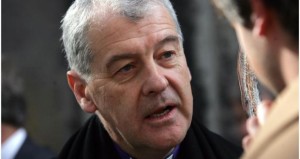
By Sarah Mac Donald - 14 December, 2015
 The Church of Ireland Primate of Ireland has called for “courage in a time of fragility” in his reflection given at the Dublin Service of Remembrance for the victims of the Paris atrocities.
The Church of Ireland Primate of Ireland has called for “courage in a time of fragility” in his reflection given at the Dublin Service of Remembrance for the victims of the Paris atrocities.
In his address, Archbishop Michael Jackson told members of the French community in Ireland as well as the Papal Nuncio, Archbishop Charles Brown, the French Ambassador, JP Thébault, and ambassadors of Belgium, Canada, Croatia, Germany, Italy, Malta and Ukraine, that “violence knows no mercy” and because of violence “people die scandalously, wrongly, unnecessarily”.
Recalling events on Friday 13th November in Paris, the Archbishop said the French capital was “a city of great beauty and vitality, a city of attractiveness and sophistication, a city of complexity and exclusion as well as a city of art and elegance”.
“Paris is Paris and all you need to do is to mention the name and people across the world know what you mean, where you are talking about. And that is clearly part of the reason why November 13th 2015 happened,” he said.
Elsewhere in his address at the Church of the Sacred Heart Donnybrook, the Archbishop of Dublin & Glendalough underlined how violence, tragedy and terrorism change lives and so does war.
“They change them irreversibly because they destroy lives and they destroy the lives of countless other people by association. The normality of going out for a meal, going to a concert, attending a football match is destabilised, disabled and destroyed. A place of innocent friendship becomes a place of sporadic gunshot, pre-planned bombing and relentless fear. And these events change a culture by changing a number of things all at once.”
He suggested that the challenge was not to “capitulate to the change in the climate of respect by retaliation” with a “downward slide of disrespect to dehumanisation”.
Reflecting on how language can be impacted, Dr Jackson said it would be very easy, for example, to cease to use the word ‘radical’ itself.
“Radical has come to mean: at war, making war. It brings with it all of the distortions needed to emplace a mind-set of hate. And so, phrases like Radical Islam do violence and insult to a long-established World Religion that is deprived of any comeback because the two words trip off the tongue together; and they have a meaning that is both destructive and unarguable.”
“Radicalisation has come to mean the negative and downward spiralling of relationship with others; it results quickly in The Other becoming incompatible with the outworking of the most aggressive expression of myself, properly understood.”
Referring to a phrase which was used at a recent ecumenical gathering in Dublin – ‘hope and fear cannot occupy the same space – invite one to stay’, Archbishop Jackson said the context of the attacks and the climate deal in Paris come together “to give us fresh responsibilities and new opportunities for ‘courage in a time of fragility’ and for the issuing the invitation to hope itself to stay”.
In Sunday’s commemoration, he said they were gathered to remember the people of Paris and all who mourn their loss.
“We do so with a solidarity that is determined to stand for freedom and fairness while standing against superstition and submission. We commemorate all of those who died and all of those who suffer on-going and horrific injuries and loss. We pray for our enemies.”
Speaking after the service to CatholicIreland.net, Archbishop Jackson spoke about the refugee crisis and those coming to live in Ireland.
He said part of the challenge for people in Ireland “is that we hold our nerve and open our hearts”.
He highlighted the parallel between the Holy Family and the refugees coming from the Middle East.
“One of the things that we remember about the first Christmas was the very hastily improvised circumstances in which Jesus was born and then very quickly as we remember on the days after Christmas – the fact that they had to flee. They became people who had to move as refugees to another country.”
“I think we need to dig deep into what makes Christmas ‘Christmas’ in Ireland and make room for people for who it will be their first Christmas in Ireland – who will come here and would really rather be at home,” he commented.
Ambassador JP Thébault told the congregation in the Sacred Heart Church Donnybrook that at the start of the Year of Mercy the hope was that “mercy will put an end to these senseless horrors”.
Speaking to CatholicIreland.net, the Papal Nuncio, Archbishop Charles Brown said, “Pope Francis has asked us to be generous and open-hearted in receiving refugees, these poor people who are escaping situations of violence and war in the Middle East.”
“As far as I can see, here in the Ireland the response thus far has been in keeping with that call for generosity and receptivity, which is very heart-warming and it shows the goodness of Irish people.”
“I myself have not seen any signs of xenophobia or resistance to what Pope Francis has proposed. To me that speaks very well about the Irish people, who themselves know what it is like in many cases to be migrants, refugees and emigrants.”
“So the Irish have a special warmth and affinity who have had to leave their country because in probably every Irish family there is at least a history of emigration, which gives them tremendous compassion and solidarity with emigrants, migrants and refugees.”